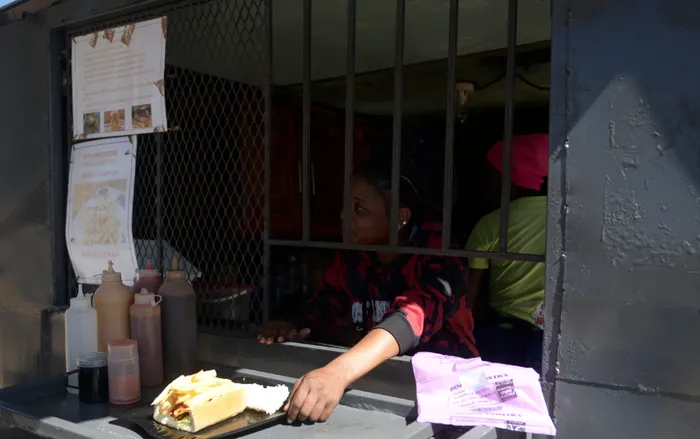Beyond Energy Racism: addressing the big elephant in the room

Picture: INLSA/Taken April 11, 2023 – Martha Chauke uses a braaistand to prepare chips for selling after being affected by the power outage in Nellmapius, Gauteng. While protests in Pimville, and Chaiwelo, and other townships have raised concerns about energy racism, less attention is given to the effects of loadshedding and load reduction on communities such as small businesses and farmers, the writer says.
“Everyone is having problems with electricity; everyone has experienced loadshedding. But people who live in Soweto and other working-class townships, have bigger problems with electricity,” according to the energy racism report published by the Centre for Sociological Research and Practice (CSRP) at the University of Johannesburg (UJ).
South Africa is experiencing a power crisis caused by the government’s failure to provide electricity to its citizens. Widespread power outages as a result of loadshedding and especially load reduction that have affected South African working-class communities such as Pimville, Chiawelo, have been met with mass protests. However, less attention is paid to other communities such as farmers and small business owners.
According to the CSRP, load reduction is an ideological weapon that is imposed on impoverished communities. Thus, the term energy racism, as these communities suffer from simultaneous power disconnections that last for long hours, days, and sometimes even months. Affluent communities such as Sandton in contrast enjoy access to electrification.
One could argue that the implementation of load reduction by Eskom is justified. According to Bheki Simelane, the power utility has argued that the power disconnection experienced by the community of Chiawelo is the result of illegal reconnection and unauthorised operations that compromise the network of Eskom. Moreover, in the foreword of the energy racism report Patrick Bond, a distinguished Professor in the Sociology Department (UJ), says that 85 percent of Sowetans engage in illegal reconnections.
While the CSRP must be commended for illuminating the agency of black working-class communities, the energy racism report does not address the power disconnections affecting farmers and small businesses as presented by Sakeliga (formerly known as AfriBusiness).
Tina Alberts, a legal and liaison officer for Sakeliga wrote, “Sakeliga, Agri North-West, and TLU SA also note that it is often agricultural farms and smaller organisations which do not fall within high-density areas that are subjected to continuous electricity supply interruptions”.
Sakeliga in collaboration with Agri North-West and TLU SA has launched a lawsuit against Eskom, as farm and small business owners in Northwest and Limpopo are subjected to load reduction regardless of paying for the usage of electricity.
Owing to this, it could be argued that The Stronghold for the Commercial Farmer in South Africa (TLU SA) comprises predominately Afrikaner-speaking people, who are excused from load reduction according to the energy racism report. But there is evidence that they are also affected by load reduction, thus Drickus Botha of TLU SA has referred to it as a “collective punishment”.
Energy racism or the big elephant in the room?
The energy racism report stated that the apartheid government marginalised black people in the provision of electricity. However, the post-apartheid government did not expand access to electricity among South Africans. Thus, like the three blind men and an elephant, the power cuts are perceived as racial warfare, whereas they transcend race as they are a result of a history of negligence.
The wake of democracy in South Africa between 1996 and 2006 was followed by increased electrification, particularly in households that were previously disadvantaged household, wrote Evan Lieberman a total Professor of Political Science and Contemporary Africa at the Massachusetts Institute of Technology (MIT).
In 2006, Hendrik Schmidt, the Democratic Alliance (DA) minerals and energy spokesperson pleaded with President Thabo Mbeki to address the electricity crisis. As the international norms had advised Eskom to have at least 10,000MV in reserve for emergency purposes. Consequently, Eskom had 5,000MV in reserve which would later result in severe blackouts if not addressed.
One could argue that the post-apartheid South African government has been inconsistent with the provision of electricity since it assumed power. Thus, this led to a crisis affecting the entire population in a form of loadshedding and load reduction. For instance, Steven Kuo, a columnist for Business Day wrote, “President Thabo Mbeki made the wrong policy choice in the early 2000s when his administration chose to ignore the pleas by Eskom to start investing in new generation capacity.”
As a result, there is a proliferation of exploding substations across the country, for example, Cebelihle Bhengu a journalist from News 24 reported that 50 percent of households in Durban experienced power cuts due to an explosion of a substation in Klaarwater. In addition, Kristen Engel, a multimedia Journalist of IOL reported that 11,000 Eskom customers residing in Scottsdene were plunged for days into power disconnections that were attributed to a compromised substation.
In this regard, the power cuts that are experienced by residents from Durban and Scottsdene are not different from the power cuts that occurred in Pimville. Thus, relegating load reduction to an issue of race is an oversimplified premise.
Furthermore, South African news website MyBroadBand reported that Eskom, the national utility, experienced liquidity and profitability issues, particularly in the mid-2000s. It was frequently bailed out by the government. Eskom received R21.9 billion (about US$1.5 billion) in the national budget for 2022. However, Tasneem Bulbulia, Creamer Media Contributing Editor Online for Engineering News and Mining Weekly, reports that the Organisation Undoing Tax Abuse (OUTA) wants Eskom to be held accountable for its of irregularities as the power utility’s debt is now R400 billion.
Therefore, the thesis of energy racism must be re-evaluated, and the organs of the South African state and the power utility must be held accountable for the provision of electricity rather than shifting the blame to the end-user to subsidise the crisis.
Kabelo Motswagae is an MA Candidate in Sociology at the University of Johannesburg